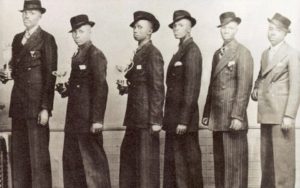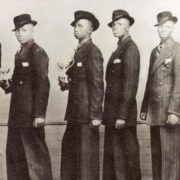The Lion Sleeps Tonight – Mbube – Wimoweh
The long journey from South Africa to Pete Seeger and the Weavers to Hollywood

Solomon Linda and the Evening Birds, ca. 1941. From l to r: Solomon Linda, Gilbert Madondo, Boy Sibiya, Gideon Mkhize, Samuel Mlangeni, Owen Sikhakhane
“The Lion Sleeps Tonight” is a song originally written and recorded by Solomon Linda under the title “Mbube” for the South African Gallo Record Company in 1939. Linda’s original was written in Zulu, while the English version’s lyrics were written by George David Weiss. The story makes a long journey from South Africa to Pete Seeger and the Weavers to Hollywood.
The Original Version
Born in 1909, Solomon Linda grew up in Zulu country in South Africa. He never learned to read or write, but he was much admired as a singer. He moved to Johannesburg in his 20s and formed an a cappella band he called the Evening Birds, who built a popular following with their distinctive style. Inspired by traditional call-and-response chants, they built four-part harmonies with Linda’s improvised vocals soaring over the top.
In 1939 Linda worked as a cleaner at the Gallo Record Company. One night after his shift he was permitted to use the studio to record a song he called “Mbube,” meaning Lion in Zulu. It became a big hit and made Linda a star among black audiences. Unfortunately, as Gallo had purchased the recording from Linda (for a reported ten shillings), Linda never earned anything from the sales.
Associated with poor migrant workers, the origins of Mbube can be traced back to the 1920s in the Natal region when the area became heavily industrialized with coalmines and factories. The style itself dates to the times when young South African Zulu men left their families to travel to the major cities to find work — often in mines. In order to preserve a sense of community, these men would form choirs and perform Mbube music. Later, women created their own mbube groups.
In 1949, Alan Lomax, was the folk music director for Decca Records. He brought Solomon Linda’s 78 recording to his buddy, Pete Seeger and his group The Weavers.
In November 1951, after having performed the song for at least a year in their concerts, The Weavers recorded an adapted version with brass and string orchestra and chorus and released it as a 78 single titled “Wimoweh,” an approximate phonetic rendering of the song’s Zulu language refrain, “uyimbube” (“you are a lion”, from “u-” [“you”], “yi-” [“are”] and “mbube” [“lion”]).
Hootenanny Tonight! ℗ 2004 Smithsonian Folkways Recordings / 1959 Folkways Records Released on: 1959-01-01
Their version contained the chanting chorus “Wimoweh” and Linda’s improvised melodic line. The Weavers credited the song as “Traditional”, with arrangement by “Paul Campbell,” later found to be a pseudonym used by the Weavers in order to claim royalties. It reached Billboard‘s top ten and became a staple of The Weavers’ live repertoire, achieving further exposure on their best-selling The Weavers at Carnegie Hall LP album, recorded in 1955 and issued in 1957.
According to journalist Rian Malan:
“Mbube” wasn’t the most remarkable tune, but there was something compelling about the underlying chant, a dense meshing of low male voices above which Solomon yodelled and howled for two exhilarating minutes, improvising occasionally. The third take was the best, achieving immortality when Solly took a deep breath, opened his mouth, and improvised the melody that the world now associates with these words:
“In the jungle, the mighty jungle, the lion sleeps tonight.”
James Durst, “Mbube” (Wimoweh), LoC, March 16, 2007
An interesting aside, as referred to in the above video, there are three problems associated with the lyrics:
-
- There are no jungles in South Africa
- Lions don’t live in jungles, they live on the plains
- Lions are nocturnal, they sleep during the day
“Wimoweh” saw many cover versions through the 1950s, but the next development edged the song further away from the original. In 1961, after the successful doo-wop group The Tokens used the song to audition for RCA Records, some producers from the label were impressed enough to try to develop a pop version. Along with a full band, they employed a soprano for extra vocals, but the real master stroke was to adapt an especially inspired segment of Linda’s original improvisation into a melody with the now-famous lines “In the jungle, the mighty jungle, the lion sleeps tonight.” Although The Tokens were initially unconvinced by this arrangement of a song they loved, they were persuaded to let it out as a B side. It seems, though, that the record-buying public saw something more in the song.
The song now-named “The Lion Sleeps Tonight” reached number one at the end of 1961 and inspired a seemingly endless string of covers. The trouble was that as the song evolved, no provision was made for recognizing Linda’s original work. It seems in the complicated process of licensing and publishing, either Linda’s ownership of the composition was ignored, or nobody quite followed the legal trail back to the original composer. As Seeger has put it: “The big mistake I made was not making sure my publisher signed a regular songwriters’ contract with Linda. He sent Linda some money then copyrighted The Weavers’ arrangement and sent The Weavers some money.” When Seeger realized the error, he arranged a donation of $1000 and his share of ongoing royalties to Linda, but it seemed even this never found its way back.
The song was also covered extensively by other folk revival groups such as The Kingston Trio, and exotica singer Yma Sumac. However, Miriam Makeba, in 1960, recorded the same song as “Mbube,” with the writing credit given to “J. Linda.”
The Lion Roars
The next twist was in 1994 when the song was featured in American animated musical film The Lion King, produced and released by Disney. The Lion King was originally released on June 15, 1994, with a positive reaction from critics, who praised the film for its music, story, and animation. With an initial worldwide gross of $766 million, it finished its theatrical run as the highest-grossing release of 1994. And is still in the top 25 highest grossing animated films of all time.
The thread was picked up in a Rolling Stone article by journalist Rian Malan, in which he estimated the royalties from the film alone at $15 million.
The surrounding publicity prompted a lawsuit against Abilene Music, who had licensed the song to Disney. In 2006, 44 years after Linda had died in poverty, he was acknowledged as the composer of the original song and his estate was awarded the rights to past and future royalties. In 2002, François Verster adapted into a documentary film A Lion’s Trail.
Over time, in the township of Soweto and elsewhere, The Evening Birds’ sound was developed over the decades into a sophisticated style, sometimes referred to as Mbube, reintroduced to the west by groups such as Ladysmith Black Mambazo and the Soweto Gospel Choir. The simple four-chord progression (I, IV, I, V) originally heard in Linda’s scratchy recording has formed the basis for countless songs, and has reverberated throughout popular western music. It wouldn’t be outrageous to claim that the now-ubiquitous four-chord circle song (comprising four chords evenly spaced and repeated through the song) grew from this tune.
Sources:
Thanks to Simeon Pillich, Ph.D.
Professor of Ethnomusicology & Popular Music
Dept. of Music, Occidental College
Thanks to Henry the Fiddler for providing me the link to an article written by Rian Malan called In The Jungle.
It provided a detailed story of the song and worthy of a reading. Here’s the link to the PDF.
Henry also provided me with this link with over 200 YouTube versions of the song:
https://www.youtube.com/@FLORENCOM/videos
The Lion Sleeps Tonight Wikipedia
The Lion Sleeps Tonight – Mbube – Wimoweh
The long journey from South Africa to Pete Seeger and the Weavers to Hollywood













